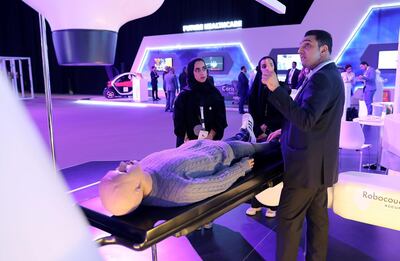Genomics to treat disease and artificial intelligence devices helping to deliver vital healthcare will have a growing influence in the near future, according to experts speaking at Dubai Health Forum.
The two-day Madinat Jumeirah event has attracted more than 35 international health experts from 18 countries to share the latest assets in treating disease and making hospitals a better patient experience.
The rise in popularity of 3D printing was one of the highlight’s of the 2017 forum, and this year’s event was also unveiling some interesting new tools at the disposal of doctors.
One of those is a headset worn by patients to help treat depression, and promises results similar to taking medication but without the side effects.
The $500 Flow Neuroscience device has been effective in trials, helping reduce symptoms of depression by 35 per cent, according to clinical psychologist Daniel Mansson.
“Patients with depression use the headset for 25 minutes a day, with a low electric current the equivalent of a 9-volt battery sent into the brain,” he said.
“It focuses on the left side of the brain, helping stimulate neurons that can help control mood.
“Less current is sent into the right side of the brain, with results proving to reduce the symptoms of depression by 35 per cent.”
_______________
Read more:
Surgeons to get better feel for remote operations when 5G technology rolls out
Cancer doctors look to virtual reality for insight into tumours
New asthma technology hopes to reduce attacks through use of real-time data
_______________
Depression is one of the most common mental illnesses, affecting 6.7 per cent of American adults each year, and about 5 per cent of residents in the UAE.
A secondary effect of using the device is the stimulation of certain ‘feel-good’ chemicals in the brain, like endorphin, oxytocin, serotonin and dopamine.
The results are the same as taking medication, but without the side effects, according to its manufacturers.

Patients taking some anti-depressant medication can feel a heightened sense of anxiety or excitement, that can lead to suicidal tendencies.
Taking medication over a long period has also been associated with liver disease, heart problems, sexual problems and weight gain.
“We know about 65 per cent of patients have these problems with medication,” said Mr Mansson.
“This device could help eliminate that and it is suitable for all age groups, and most kinds of depression.”
Other topics discussed at the forum include synthetic genomics, precision medicine and wellness, medical tourism, population health management, blockchain and the mathematics behind weight loss.
“Last year at the forum, we discussed the implementation of 3D printing,” said Dr Manal Taryam, head of Dubai Health Authority’s Primary Health Centres.
“Within one year we have already conducted some surgeries using 3D printing at DHA hospitals and we have introduced the technology in the field of dentistry across DHA’s dental clinics.”
Artificial intelligence companies are discussing how the technology can be used in population health management by using digital avatars capable of answering specific patient queries.
It may seem like science fiction, but some of the international companies behind the AI technology believe it could be in place by 2025, reducing the need for face time with human doctors.
A new blood testing kit by Pathway Genomics promises to collect blood samples from undiagnosed individuals at high risk from cancer to help detect the disease at an earlier stage.
The DHA is planning to focus on the use of robotics in heart, eye and other organ surgeries; and the implementation of blockchain in health care delivery to help secure data allowing it to be shared by health departments safely.
It is also expanding the use of smart technology and sensors in geriatric care.
The DHA is the first government health organisation in the region to implement telehealth, with RoboDocs placed at Hatta Hospital’s emergency department and DHA’s 24-hour primary healthcare centres in Al Barsha and Nad Al Hammar.
They are linked to Rashid Hospital’s Trauma Centre, giving doctors outside of the emirate access to patients to help with diagnosis and treatment advice.
Specialist use of home-care programs are also helping improve geriatric care through the latest developments in telehealth.
“Individualised care will take centre-stage in the years to come,” Dr Taryam said.
“All these technologies are aimed to improve the lives of patients better.”


